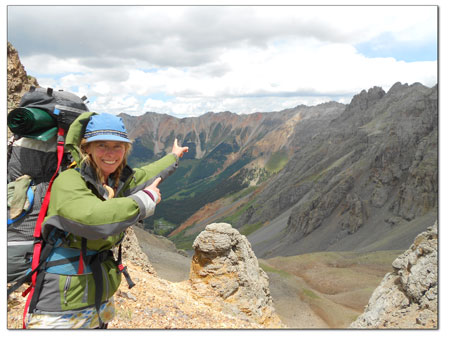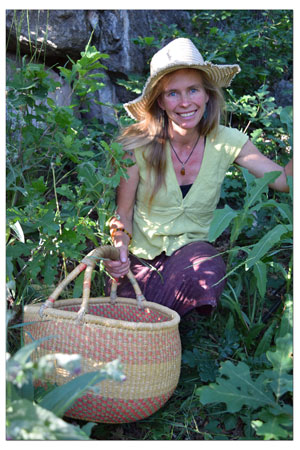
Katrina Blair during her annual “walkabout” high in the San Juans, en route to the Telluride Mushroom Festival. During the weeklong trip, she subsists entirely on the plants and berries she forages and is so confident in her skills, she doesn’t even bother to bring a backup stove./Courtesy photo.
More than weeds
Local wild weed advocate’s latest book striking a chord
Katrina Blair’s audience is growing like a weed. The longtime Durango resident’s new book, The Wild Wisdom of Weeds, which was published in November, has already sold out of its first run and is on its second printing. Thanks to a heightened interest in the subject, and a favorable review in the New York Times, Blair exceeded even her publisher’s expectations by selling out 4,000 books in just a couple months.
JusttheFactsWhat: “The Wild Wisdom of Weeds,” a presentation by Katrina Blair and Jaime Becktel
When: 6:30 p.m., Thurs., Feb. 26
Where: Mancos Public Library, 533-7600
|
Blair, who is the purveyor of the Turtle Lake Refuge, has spent much of her adult life advocating the benefits of weeds, as well as fighting against the use of pesticides and herbicides to eradicate said plants.
This book, her second, highlights 13 weeds that can be used for food and medicine, including such well-recognized ones as dandelion, lambsquarter, mallow, plantain and thistle. All the plants listed in her book grow on each of the seven continents. Blair remarks that she, “fell in love with these plants all over again during the writing of the book,” and she even had a 10-day period during the research where she ate nothing but those 13 plants.
Blair notes that she considers herself more of an opportunist than a vegan or vegetarian, but feels best when she eats a local-food diet. “The more we refine food, the more the vitality goes down,” says Blair, who is currently on the East Coast promoting her book. “I thrive on fresh, wild, local food, which gives me a high level of clarity and energy.”
Blair was raised to be resilient. Her father, Rob Blair, now a retired geology professor from Fort Lewis College, taught her to ski, hike and climb. Her mother, Pat Blair, who started Durango Natural Foods, imparted an appreciation for plants and nutrition. “My dad opened the wild, and my mom opened the doors to health,” says Blair.
 Blair in her natural habitat. The founder of Turtle Lake Refuge recently sold out of the first 4,000 copies of her book, The Wild Wisdom of Weeds./ Photo by Cheryl Foley
|
She was camping in the Tetons before she learned to walk and started climbing at the age of 10 at X-Rock. She spent her high school years in New Zealand, while her father worked on a sabbatical, and learned to appreciate the value of travel and understanding other cultures.
Perhaps her most formative and legendary experiences happened in the form of what she calls a walkabout. Blair simply hikes for days, feeding herself on the food she forages. August is typically the best month, and she boasts that in one day, while hiking to Silverton, she foraged 19 different kinds of berries. She says she’s always had a mystical connection to the land, with plants in particular. “As a kid floating on Haviland Lake, I felt drawn to the plants on the edge of the lake, and they seemed to say to me, ‘You’re going to live with us now.’”
And she has. Her most well known walkabouts are the annual week-long pilgrimages she makes to Telluride for the Mushroom Festival, where she conducts educational workshops. She lives entirely on the plants and berries she forages and is so confident in her skills she doesn’t even bother to bring a backup stove. Blair notes that the first three days she is typically lethargic. Then something happens, once the detoxing period is over, her energy reaches an all-time high. “By the time I arrive to Telluride I’m riding a high, it’s as good as I feel at any point in the year. It’s like a cleanse.”
During the walkabouts, Blair also touches base with her roots as an explorer of the mountains. “I have this deep, profound, trust in nature,” she shares. “While I’m in these precarious situations I don’t have the luxury to have fear. I trust in myself and my intuition.”
As a kid, her only household rule was: be true to yourself. In all her experiences with edible plants, she’s only eaten something poisonous once, a twin berry, that is only considered mildly harmful. Fortunately, the effects were minimal, and she recovered quickly.
As one could expect, the book is full of detailed wisdom and creativity. Blair calls it “heavy”, containing more than 350 pages of information and a complete array of photographs of herself, the plants and many members of the Durango community and Turtle Lake family. Recipes range from Hollyhock strawberry baskets to Clover Flower Apple Pie and Plantain Breakfast Porridge.
Common ground: City brings natural turf expert to speakWhen it comes to weeds in city parks, the City of Durango finds itself straddling two ends of the playing field. On one side is the community desire for parks and playing fields free of harmful chemicals; on the other, a need for safe, durable and aesthetically pleasing turf.
And somewhere in between is the City’s Parks and Recreation Department, which is working to find a middle ground. Those options, opportunities and challenges will be the topic of a presentation next Mon., Feb. 23, from 5 - 7 p.m. at the Durango Public Library.
The talk will feature Massachusetts consultant Chip Osborne, owner of Osborne Organics, who in 2013 helped the city craft its Organically Managed Lands Program.
Known as one of the country’s leading experts on sustainable, natural turf, Osborne has more than 10 years experience in turf management and 35 years experience as a professional horticulturist. He is also a member of “Beyond Pesticides” and Chairman of the Marblehead, Mass., Recreation and Parks Department.
The organic parks plan was done at the behest of community members concerned over the use of synthetic pesticides and herbicides on local parks. As a result, the city agreed to pursue a kinder, gentler approach to parks management in 2013. In the fall of that year, the city enlisted Osborne to help with the organic parks plan. Nine parks were selected for the program: Brookside, Fanto, Folsom, Iris, Needham, Pioneer, Riverfront, Riverview Sports Complex and Schneider.
However, a year later, the City proposed suspending the program on three of those parks: Fanto, Riverview and Brookside. The move would save Durango about $66,000 a year, although City Parks and Recreation Manager Cathy Metz said it wasn’t just about the money – which equates to more than three quarters of the total budget for the program. “We’ve been getting complaints from the community,” Metz told the Telegraph last October.
Some of the parks and fields were as much as 50 percent weeds, which was unsightly as well as a hazard to players, according to city officials.
In the end, City Council voted Dec. 1, 2014, to remove two parks, Brookside and Riverview, from the organic program. In 2014, the city spent about $85,000 on organic parks, much of which was used to maintain Folsom and Riverview.
– Missy Votel
|
In The Wild Wisdom of Weeds , Blair also features her battle against the use of herbicides in Durango’s city parks. She believes that as a community, Durango can lead the way for other communities to discontinue the use of herbicides, which she feels are harmful to those who visit the parks. She says that “changing anything is challenging, but as we remove those herbicides it does increase our quality of life.” She adds that she is grateful that there has been some success in Durango, and that the City was a supporter in trying to make it happen.
Blair recommends moving toward eating these 13 plants methodically. “The integration should be small and slow. Wild food is so potent, starting with your morning green smoothie is a good idea for entry.”
She attributes her success with the book to the growing environmental awareness throughout the country. “The ground is prime. There’s so much awareness right now. It’s a small, yet perfect solution to start using these resources.”
For more information about Turtle Lake Refuge visit: www.turtlelakerefuge.org. “The Wild Wisdom of Weeds” is available locally and through publisher, Chelsea Green.
In this week's issue...
- December 18, 2025
- Let it snow
Although ski areas across the West have taken a hit, there’s still hope
- December 18, 2025
- Look, but don't take
Lessons in pottery theft – and remorse – from SW Colorado
- December 11, 2025
- Big plans
Whole Foods, 270 apartments could be coming to Durango Mall parcel
